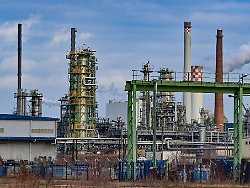In extreme cases, expropriation
Bundestag facilitates access to energy companies
May 12, 2022 at 9:32 p.m
The sanctions against Russia because of the Ukraine war have a major impact on the supply of oil and gas. In order to be able to act better in an emergency, the Bundestag passes an amendment to the Energy Security Act. It could be relevant in the case of the refinery in Schwedt.
In future, the state in Germany should be able to access energy companies more easily if there is a risk of significant supply bottlenecks. The Bundestag approved a corresponding reform of the Energy Security Act from 1975 with the votes of the government factions SPD, Greens and FDP as well as the left. The AfD rejected the plans, the CDU/CSU abstained. The Federal Council still has to approve the project, which according to Federal Minister of Economics Robert Habeck could happen next Friday.
The law could have consequences for the PCK refinery in Schwedt an der Oder in Brandenburg, which is extremely important for the oil supply of East Germany. So far, it has primarily processed Russian oil. PCK is majority owned by Rosneft Germany, a subsidiary of the Russian state-owned company Rosneft. Because of the embargo on Russian oil imports discussed at EU level, Habeck is looking for alternative oil sources for Schwedt via Rostock, possibly also via Danzig. The law could also play a role in the gas sector.
Companies in the energy sector are part of the critical infrastructure in Germany. This means that they have a special meaning for everyday life, which is why their own specifications apply. If there is a “concrete risk” that a company will not fulfill its tasks and there is a risk that security of supply will be impaired, the reformed law can temporarily place it under trusteeship. In order to ensure security of supply, the possibility of expropriation is created for companies in critical infrastructure as a last resort.
Gas suppliers are allowed to adjust prices
If, in particular, gas imports to Germany are significantly reduced, gas suppliers get the right to adjust their prices – i.e. to increase them. The prerequisite is that the second or third level in the gas emergency plan, the alarm or emergency level, has been officially determined. Customers must be informed of this in good time and have the right to cancel. The exception rule for temporarily increased prices expires when the Federal Network Agency formally determines that the shortage has ended.
While the AfD politician Rainer Kraft accused the coalition of a poorly and hastily made law and “neo-communist ideas”, the other two opposition factions, the CDU/CSU and the Left Party, signaled basic support. CDU politician Mark Helfrich said the Union would have liked to support the traffic light, but had stomach ache at the point of price adjustments in the event of gas shortages. Therefore, the Union can only abstain. For the left, MP Matthias Birkwald criticized the fact that state-controlled companies should be privatized again after the risk to security of supply has subsided. Nevertheless, the left agrees with the law.
